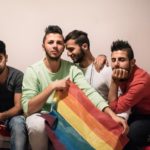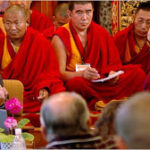International human rights law today stands on the United Nations Charter of 1945, the Universal Declaration of Human Rights of 1948, the European Convention on Human Rights of 1950, and two UN 1966 treaties: the International Covenant on Civil and Political Rights and the International Covenant on Economic, Social and Cultural Rights.
These initiatives have made important and lasting strides towards ensuring the human rights of people worldwide, protecting them against discrimination on the basis of race or gender. They also protect specific groups, such as refugees, children, cultural minorities, indigenous groups, migrant workers, and those with disabilities.
Not until recently did the UN begin an active program for the protection of the rights of homosexuals. On the issue of law and homosexuality at the international level, the global activist movement advocates for the basic legal provision of personal privacy and equality.
1 Sexual Orientation in International Law 5/07
2 Resolution on Decriminalisation of Sexual Orientation 4/09
3 ILGA Document: State Sponsored Homophobia 5/09
4 Foreign Office to back gay communities around the world 7/09
5 The UNHCR’S…Refugee Claims re: Sexual Orientation and Gender Identity 7/09
6 Lesbian, gay, bisexual, and transgender (LGBT) related laws 8/09
1
Sexual Orientation in International Law: What role has international law played in the LGBT movement?
Does the international legal system recognize the rights of lesbians, gay men, bisexuals and transgendered people? What is the history of the LGBT movement within the UN system?
Professor Douglas Sanders answers these questions and explains the history of sexual orientation and gender identity in his article “Human Rights and Sexual Orientation in International Law.” Professor Sanders is a Canadian citizen and resides in Bangkok, Thailand. He is a professor of law at the University of British Columbia in Vancouver and Chulalongkorn University in Bangkok. When Professor Sanders addressed the United Nations on behalf of ILGA in 1992, he made history by becoming the first openly gay individual to address the UN and giving the first speech to address LGBT issues at the UN.
Read more: International Lesbian, Gay, Bisexual, Trans and Intersex Association (ILGA) website.
2
Resolution on Decriminalisation of Sexual Orientation from the 16th Commonwealth Law Conference Hong Kong
Considering that 41 of the 53 Commonwealth (former British territories) jurisdictions retain laws providing for criminal punishment of adult, private, consensual sexual conduct by persons of the same sex more than 40 years after the repeal of such provisions in the United Kingdom from which they were introduced into the laws of countries of the Commonwealth;
Considering that there are strong arguments that such laws may exceed the proper ambit of the criminal law in a modern democratic society and may involve, or give rise to, breaches of universal norms of human rights;
Noting the observations in recent years of respected leading citizens of Commonwealth countries calling for reform of such laws and drawing attention to the impediment that such laws may cause for successful strategies in Commonwealth countries to tackle the spread of HIV/AIDS; and
Reflecting on the deliberations of the 16th Commonwealth Law Conference of the Commonwealth Lawyers Association (CLA) held in Hong Kong SAR from 5th -9th April 2009;
The CLA calls on the Secretary-General of the Commonwealth to establish a working group of appropriately diverse membership and background and consult widely in Commonwealth countries and to report back to the Secretary-General before the next Commonwealth Law Conference in Hyderabad, India in April 2011 so as to permit consideration of this topic in the institutions of the Commonwealth and within the CLA and to suggest ways to tackle this issue consistently with the Commonwealth’s commitment to universal human rights for all Commonwealth citizens.
Commonwealth Lawyers Association (CLA)
16th Commonwealth Law Conference
3
ILGA Document: State Sponsored Homophobia – A world survey of laws prohibiting same sex activity between consenting adults
Homophobia is the fear of, aversion to, or discrimination against homosexuality or homosexuals. It is the hatred, hostility, or disapproval of homosexual people. While appalling and dangerous – and at times murderous – when it is found in individuals, formal or informal groups, it makes life for Lesbian, gay, bisexual, trans or intersex (LGBTI) persons a misery, often leading these to a devastating feeling of insecurity even within their families of origin.
Homophobia is even more appalling and dangerous – and again murderous – when found in the very letter of the law. When discrimination and hatred are enshrined in the texts meant to sanction the social pact embodied by a State, a homosexual knows that there is nowhere to turn to for help. Many of us have known what it means to live in a State like that – a mixture of terror and sense of betrayal, a disorientation and sheer disbelief when trying to understand what is supposedly wrong with oneself.
These feelings, and the knowledge of the physically and mentally painful consequences of State sponsored homophobia, are so unbearable that almost always self-denial seems to be the only possible – albeit deceiving – way out. Whereas no one should be discriminated against, nor persecuted, nor killed on the basis of sexual orientation, we all know that the chances of a total eradication of homophobia, or racism, or other forms of hatred, from humankind are not too high, to say the least. Probably, there will be always a few individuals infected with the virus of homophobic hatred, as there will be always rapists, torturers and murderers. What is unacceptable, however, is the idea of a State condoning, sanctioning and encouraging these practices, particularly when the same State proclaims to abide by the principles of the Human Rights Declaration.
The UN High Commissioner for Human Rights, Navanethem Pillay, said in her historic speech on the occasion of the – equally historic – UN Statement signed in New York last December by 66 countries against the criminalization of homosexuality, that ―there are those who argue that because sexual orientation or gender identity are not explicitly mentioned in any of the conventions and covenants, there would be no protection. My response is that such a position is untenable in legal terms, which is confirmed by the evolving jurisprudence. The principle of universality admits no exception. Human rights truly are the birthright of all human beings.
This is why, for the third year, ILGA is publishing an annual report on state sponsored homophobia throughout the world. We want to name and shame the States, which at the end of the first decade of the 21st century still treat their LGBTI citizens like lesser persons, unworthy of consideration. The unworthiness rests entirely on these States, for theirs is the shame of depriving a significant number of their citizens of dignity, respect and the enjoyment of equal rights…
Read the entire report at ILGA
4 July 2009 – guardian.co.uk
4
Foreign Office to back gay communities around the world
• Minister praises diplomats for supporting rights
• Issue could be addressed at Commonwealth talks
by Patrick Wintour, The Guardian
The Foreign Office is to risk the wrath of homophobic regimes worldwide by encouraging British ambassadors to do more to support gay communities.
Chris Bryant, the new Foreign Office minister, who is gay, has started writing personal letters of congratulations to British diplomats who show public support for gay rights. He is praising them for such support even if it draws anger from national governments or local homophobic groups. On the eve of today’s Gay Pride March in London, Bryant sent handwritten letters of personal congratulations to three British ambassadors in eastern Europe after they were angrily accused by national governments of promoting gay rights.
He has also decided to ask British high commissioners in the Commonwealth to promote the rights of gay people, even though this will run contrary to the teachings of some local churches and governments. Bryant would like to see gay rights addressed at the Commonwealth summit in November in Trinidad, due to be attended by the Queen and Gordon Brown.
In a letter to the British ambassador in Poland, Ric Todd, Bryant wrote: “I wanted to congratulate you on your flying of the Rainbow flag next to the Union flag last year, and your guide to lesbian gay and bisexual and transgender rights translated in Polish this year. I know you had some flak, but frankly more power to your elbow. Britain is not just a tolerant country. We fully respect the rights of everyone, regardless of their sexuality.” Todd was criticised for exceeding his authority by Janusz Kochanowski, the Polish civil rights ombudsman.
Bryant also wrote to the British ambassador in Bulgaria, Stuart Williams, who sent a message of support to the Rainbow friendship rally in Sofia earlier this year. Bryant wrote: “I fully support what you have done. I am sure that your coverage will have given confidence to many.” He is also to write to the British ambassador to Bucharest, Robin Barnett, to thank him for attending the gay rights march in the Romanian capital last month.
The purpose of the Bryant letters is to spell out that the British Foreign Office policy of support for gay and lesbian rights is not just a formality, but instead a central part of the government’s drive for human rights that diplomats are to champion as part of British foreign policy.
Bryant’s determination to take this campaign within the Commonwealth will be hugely controversial if he pushes the message and diplomatic pressure hard. Many Commonwealth states maintain laws criminalising homosexuality—including most of the countries of the Caribbean and more than two-thirds of African nations. In four African countries, including Nigeria, consensual homosexual acts are still punishable by death.
July 30, 2009 – ASIL Insight
5
The UNHCR’S Guidance Note on Refugee Claims Relating to Sexual Orientation and Gender Identity
by Nicole LaViolette
Introduction
The human rights situation of sexual minorities around the world continues to be alarming. Many countries maintain severe criminal penalties for consensual sex between persons of the same sex, including the death penalty. In several countries, restrictions have been imposed on the freedoms of expression and association of sexual minorities, while in others homosexuality and transexuality are perceived as crimes against religion, sexually deviant and immoral behaviours, mental disorders, or unacceptable challenges to gender-specific roles.
Such egregious human rights violations have led some lesbian, gay, bisexual, and transgender (LGBT) people to seek refuge in countries with better human rights protection. While this movement of refugees essentially began in the early 1990s, it is only recently that the United Nations High Commissioner for Refugees (UNHCR) has directly addressed the issue by releasing in November 2008 the UNHCR Guidance Note on Refugee Claims Relating to Sexual Orientation and Gender Identity (Guidance Note).
Background
The international community codified the rights and status of refugees in two international instruments: the 1951 UN Convention relating to the Status of Refugees (the Convention), and the 1967 Protocol relating to the Status of Refugees. By signing the Convention and its Protocol, States have accepted the main obligation that flows from the international instrument, which mandates that signatory states will not return any individual to a territory where his or her life or freedom will be threatened. However, the legal responsibility to provide protection applies only if a person meets the definition of a refugee as provided for in the Convention.
Persons seeking asylum must satisfy two main legal tests: (1) they must demonstrate a well-founded fear of persecution; and (2) they must substantiate that the persecution they fear is on account of their race, religion, nationality, political opinion, or membership in a particular social group. In addition, refugee protection is conferred only if the claimant succeeds in showing that the country of nationality or habitual residence is unwilling or unable to offerprotection.
Several States have interpreted the Convention to extend asylum and refugee protection to women and men fleeing persecution based on their sexual orientation and gender identity. Since the early 1990s, decisionmakers in countries such as Canada, the United States, the United Kingdom, Germany, New Zealand, Australia, Finland, Belgium, and the Netherlands have granted refugee status to individuals who fear persecution based on their sexual orientation or gender identity.
Overview of the UNHCR’S Guidance Note
Under the 1951 Convention, the UNHCR is responsible for monitoring the application of the treaty by member States. In order to do so, the UNHCR provides interpretations of the legal norms set out in the international refugee protection regime. The Guidance Note format is one of several soft law tools used by the UNHCR to provide persuasive legal interpretations to governments, decision-makers, practitioners, and UNHCR staff carrying out refugee status determination in the field.
The UNHCR also publishes a Handbook on Procedures and Criteria for Determining Refugee Status (Handbook) in addition to a series of Guidelines on International Protection(Guidelines). According to the UNHCR, Guidance Notes “do not necessarily follow the same extensive drafting process” as other interpretive publications and they “should be read in conjunction with the relevant Guidelines on International Protection. In the case of the Guidance Note on Refugee Claims Relating to Sexual Orientation and Gender Identity, the relevant Guideline is the Gender-Related Persecution within the Context of Article 1A(2) of the 1951 Convention and/or Its 1967 Protocol Relating to the Status of Refugees…
Read the entire ten page report at ASIL Insight
About the Author
Nicole LaViolette is Vice Dean and Associate Professor of Law at the University of Ottawa, Canada. Her scholarly research is devoted mainly to international human rights, international humanitarian law, and the rights of refugees. She has recently published an article entitled “Independent Human Rights Documentation and Sexual Minorities: An Ongoing Challenge for the Canadian Refugee Determination Process” in a 2009 issue of the International Journal of Human Rights
August 2009 – Wikipedia
6
Lesbian, gay, bisexual, and transgender (LGBT) related laws
Lesbian, gay, bisexual, and transgender (LGBT) related laws vary greatly by country or territory – everything from legal recognition of –same-sex marriage or –other types of partnerships, to the death penalty as punishment for same-sex sexual activity.
LGBT-related laws include but are not limited to: sodomy laws, anti-lesbianism laws, higherages of consent for same-sex activity, government recognition of same-sex relationships,LGBT adoption, -sexual orientation and military service, immigration equality, anti-discrimination laws, and hate crime laws regarding violence against LGBT people.
















